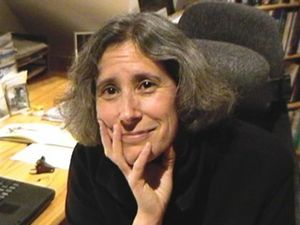Lucy Suchman facts for kids
Quick facts for kids
Lucy Suchman
|
|
|---|---|

Lucy Suchman
|
|
| Born |
Ithaca, New York
|
| Occupation | Professor, anthropologist |
| Employer | Lancaster University |
| Known for | Human–computer interaction |
Lucy Suchman is a retired professor from Lancaster University in the United Kingdom. She is known for studying how people and technology interact. She also did important work at Xerox PARC in the 1980s and 90s.
Her current research looks at how technology is used in wars. This includes studying how soldiers understand their surroundings during training. She also examines how automated weapon systems are designed and used. Lucy Suchman asks important questions about who controls these technologies. She also thinks about how they affect fairness and the chance for a more peaceful world. She is part of the International Committee for Robot Arms Control. This group works to control robot weapons. She also writes a blog about making sure robots are used ethically.
Before joining Lancaster University, she worked for 22 years at Xerox's Palo Alto Research Center (PARC) in California. There, she was a lead scientist and managed a research team. While at PARC, she famously studied how people used copy machines. She watched them closely to understand their struggles.
Lucy Suchman went to the University of California, Berkeley. She earned her bachelor's degree in 1972, her master's in 1977, and her doctorate in Anthropology in 1984. For her doctorate, she studied how artificial intelligence (AI) plans things. She looked at how these plans affected how people used computers. She also studied how office work was done. This helped her understand how assumptions about work shaped computer systems.
Understanding People and Machines
Lucy Suchman's early research was influenced by ethnomethodology. This is a way of studying how people make sense of their everyday lives. Her book, Plans and Situated Actions: The Problem of Human-machine Communication (1987), was very important. It helped create the field of human-computer interaction (HCI).
She challenged common ideas about how interactive systems should be designed. She argued that people's actions are always changing. They depend on how people interact with their surroundings and other people. She made big contributions to studying how people behave and talk. She also helped develop ways to involve users in designing computer systems.
An updated version of her book came out in 2007. This second edition was called Human-Machine Reconfigurations: Plans and Situated Action. It included new chapters about how computing and technology studies had changed since the 1980s. In this book, Suchman explored how humans and machines interact. She focused on the idea of machines that act like humans. Her later research looks at how much control humans and technology have over each other. She pays special attention to self-driving weapon systems.
Working with Others
In 1988, Lucy Suchman helped organize a conference about computer-supported teamwork. She also chaired the first conference on involving users in designing computer systems. From 1982 to 1990, she was on the board of directors for Computer Professionals for Social Responsibility. She helped start this group.
Lucy Suchman is currently a member of the International Committee for Robot Arms Control. She also helps edit a science journal called Social Studies of Science.
She is connected to many universities. She was president of the Society for Social Studies of Science from 2016 to 2017. She has also been a visiting researcher at King's College London. She was an adjunct professor at the University of Technology in Sydney. Currently, she is an adjunct professor at the IT University of Copenhagen in Denmark.
Awards and Recognition
Lucy Suchman has received many awards for her important work:
- 1988 Xerox Corporate Research Group's Excellence in Science and Technology Award
- 2002 Benjamin Franklin Medal in Computer and Cognitive Science
- 2005 Outstanding Contribution to Research Award from the Communication and Information Technologies Section of the American Sociological Association
- 2010 Lifetime Research Award from the Association for Computing Machinery (ACM) Special Interest Group on Computer-Human Interaction
- 2011 Honorary Doctorate at Malmö University
- 2014 John Desmond Bernal Prize from the Society for Social Studies of Science
- 2018 Honorary Doctorate at Maastricht University
See also
- Science studies
- Science and technology studies
- Cognition
- Philosophy of mind
- Ethnography
 | Victor J. Glover |
 | Yvonne Cagle |
 | Jeanette Epps |
 | Bernard A. Harris Jr. |

